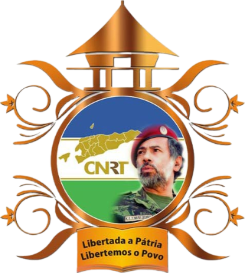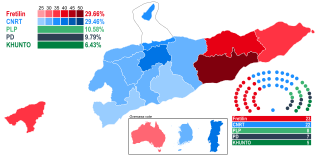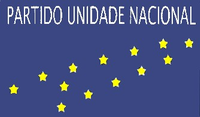
The political system in Timor-Leste is a unitary semi-presidential representative democratic republic, whereby the Prime Minister of Timor-Leste is the head of government and the President of Timor-Leste functions as head of state. Timor-Leste has a multi-party system. Executive power is exercised by the president and the government. Legislative power is vested in both the government and the National Parliament. The Judiciary is independent of the executive and the legislature. The East Timorese constitution was modelled on that of Portugal, with lesser power given to the president. The country is still in the process of building its administration and governmental institutions. The Economist Intelligence Unit rated East Timor a "flawed democracy" in 2022.

The Revolutionary Front for an Independent East Timor is a centre-left political party in East Timor. It presently holds 23 of 65 seats in the National Parliament. Fretilin formed the government in East Timor until its independence in 2002. It obtained the presidency in 2017 under Francisco Guterres but lost in the 2022 East Timorese presidential election.

The Social Democratic Party is an East Timorese party founded on 20 September 2000. Despite its name, the party, like its Portuguese model, is usually categorised as centre-right in the political spectrum. It describes itself as being in the middle between left and right (centrist). The aim of the party's founders was to offer voters a moderate alternative to Fretilin and UDT. In 2002, the party had 8,000 members. Since then, the PSD has lost its importance. The PSD did not contest the 2023 parliamentary elections in East Timor.

The Timorese Social Democratic Association was a political party in East Timor. Both the original ASDT of the 1970s and the current party of the same name are founded by the late ex-Timorese President Francisco Xavier do Amaral.

The Timorese Democratic Union is a conservative political party in East Timor. It was the first party to be established in the country on May 11, 1974, following the Carnation Revolution in Portugal.

The Association of Timorese Heroes, sometimes known as Sons of the Mountain Warriors, is a culturally conservative political party in East Timor. In 2007, KOTA said it had 30,000 members.

The People's Party of Timor is a conservative political party in East Timor. Its predecessor was the Movimento do Povo de Timor-Leste MPTL. The PPT is described as a conservative, backward-looking traditional party with utopian ideas and monarchist and religious tendencies.

The Democratic Liberal Party is a centre-right conservative-liberal party in East Timor. The PDL is a party in East Timor that was founded as the Liberal Party in May 2001. It was renamed in 2011.

Parliamentary elections were held in East Timor on 30 June 2007. The new composition of East Timor's national parliament was determined by the country's population. 529,198 voters were entitled to vote, 708 polling stations were ready.

The National Congress for Timorese Reconstruction is a political party in East Timor founded by former President Xanana Gusmão in March 2007 in preparation for the 2007 parliamentary election.

Parliamentary elections were held in East Timor on 7 July 2012. The United Nations stated that it would withdraw its 1,300 troops if the elections passed off peacefully. The National Congress for Timorese Reconstruction, led by Prime Minister Xanana Gusmão, won the election with 30 seats, three seats short of a majority in National Parliament.

Parliamentary elections were held in East Timor on 22 July 2017. Fretilin narrowly emerged as the largest party in the National Parliament, winning 23 seats to the 22 won by the National Congress for Timorese Reconstruction, which had been the largest party in the outgoing Parliament.

Kmanek Haburas Unidade Nasional Timor Oan is a political party in East Timor. KHUNTO is affiliated with the Korka martial arts group, and has a membership base that consists of various martial arts groups throughout East Timor.

Early parliamentary elections were held in East Timor on 12 May 2018 after the National Parliament was dissolved by President Francisco Guterres on 26 January 2018.
Maria Madalena Brites Boavida is an East Timorese politician, a member of FRETILIN, and a former Minister of Planning and Finance in the National Parliament of East Timor.

Dionísio da Costa Babo Soares is an East Timorese politician, and a member of the National Congress for Timorese Reconstruction (CNRT). From June 2018 to May 2020, he was the Minister for Foreign Affairs and Cooperation, under the VIII Constitutional Government of East Timor; he had earlier served as Minister of State, Coordinator of State Administration Affairs and Justice, Minister of State Administration, and Minister of Justice.

Maria Fernanda Lay is a politician in East Timor. She has been a member of the National Parliament of East Timor since 2007. In 2023, she was elected as president of the National Parliament, becoming the first woman to lead the body.

Parliamentary elections were held in East Timor on 21 May 2023. The governing coalition going into the election was a four-party government of Fretilin, the People's Liberation Party (PLP), Kmanek Haburas Unidade Nasional Timor Oan (KHUNTO) and the Democratic Party (PD), whilst the National Congress for Timorese Reconstruction (CNRT) was in opposition but held the presidency.


















